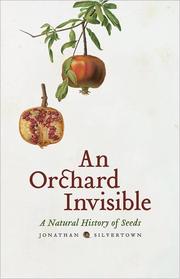Demons in Eden : the paradox of plant diversity by Jonathan Silvertown - ISBN 9780226757728 - The University of Chicago Press 2008
Motivation
Wanting to explore my view of evolution as an open-ended, and thus perpetual, arm-race for resources by means of embodied functions as organisms.
Reading
- Preface
- "our evolutionary heritage - the rich variety of animal and plant species on Earth that is called <<biodiversity>>." (p.ix)
- "Preventing these extinctions is an urgent task, but so is understanding what we might lose. Why are there so many plant species? " (p.ix)
- "Evolution is change. Every question about the rise of diversity or its demise is, at a fundamental level, an evolutionary question. " (p.ix)
- 1 An Evolving Eden
- "convergent evolution. When environmental conditions are similar in different parts of the world, evolution has often fashioned similar looking organisms in each of them, but using different, local starting materials. " (p2-3)
- "Paradoxical though it sounds, convergence is one way in which evolution generates diversity. By recreating the same type of plant in different geographical regions, evolution has produced not just one group of cactuslike plants but two:" (p3)
- "The Darwinian mechanism requires three ingredients for it to work.
- First, there must be variation among the individuals of a species. [...]
- The second ingredient in Darwin's mechanism is heredity. [...]
- Finally, selection must favor some inherited variants over others." (p8)
- "a mechanism designed to favor only a creature with superlative powers of reproduction: a Darwinian demon. " (p10)
- "There is a potential Darwinian demon hiding in every species because all populations are capable of increasing geometrically if unchecked. " (p10)
- "These are the two themes of this book. They are the how and the why of plant biodiversity - how it evolves and why it persists. " (p12)
- 2 The Tree of Trees
- "The only way to comprehend the structure of a phylogenetic tree is to infer it from the relationships among its individual twigs and work backward toward the root of the tree. " (p15)
- "convergent evolution makes leaf shape worthless for phylogeny reconstruction: the character does not tell you who is related to whom. This a general problem with all rapidly evolving characters. " (p16)
- "Molecular systematics, as its name implies, uses molecular rather than anatomical characters to make inferences about relationships among groups. The molecule in question is DNA, the hereditary material itself, the stuff of which genes are made." (p19)
- "based on the idea that two species sharing a mutation that is absent from the original sequence must be related to one another through an ancestor that carried that mutation. " (p20)
- 3 Succulent Isles
- "All these islands were born at sea, far enough from any continent to avoid being deluged by species as soon as the lava of their formation had been quenched by the ocean. Because plants and animals had to cross large distances to reach the islands, they filtered onto them one or two at a time, only to find mostly empty habitat. What happened to them next is what interests us. " (p29)
- "The use of molecular phylogenies to reconstruct the migration pathways taken by populations in the past is known as <<phylogeography>>. It works on the assumption that species sitting on the lowest branches of a phylogenetic tree are not only genetically close to the ancestor of the group, but also geographically close to the location of that ancestor. " (p30)
- "What if colonization over a distance is like a race in which the prize of island possession goes to the first past the post and the winner takes all? " (p32)
- "if it is true that demon colonizers inhibit later arrivals, how do we get so many species on islands? " (p33)
- "Every species must have its day as a demon, spreading uncontrolled for a while, or it would never become established. We also know, thanks to phylogeography, that many species-rich groups of island endemics improbably descend from just a single colonization event. " (p34)
- "how to reconcile the evolution of diversity with the fact that natural selection favors individuals with demon traits and dominating proclivities. " (p34)
- "What Darwin described as an organism's <<place in the economy of nature>> we now call its ecological <<niche>>." (p38)
- "Adaptation to new niches was Darwin's solution to the problem of how evolution produces diversity. The fact that he deduced the idea without the modern phylogenetic evidence that proves him right is yet another instance of the power of his theory of evolution. " (p38)
- "there is another way in which new species can evolve. They can also arise by geographical isolation alone, even when there is no ecological change. " (p38)
- "One reason why island speciation happens is because the founders reaching an isolated island will usually be very few in number. Small numbers of individuals taken from a variable source population are bound to be a biased and unrepresentative sample. " (p38)
- "These eccentric founders pass their peculiarities on to future generations and characters that were unusual or extreme in the source population become the norm in the new one. This is known as the <<founder effect>>." (p38)
- "So, start with the founder effect, add some random eccentricity, keep this simmering in small, reproductively isolated populations over a few generations, and you have the recipe for a new species to evolve by geographical isolation. " (p38)
- "natural selection will tend to produce adaptive changes in the new population that will accelerate the rate at which it diverges from its ancestors. " (p38)
- "new species evolve from the refugees that escape from the demons’ dominion." (p39)
- "There are two ways to escape:
- into kinds of habitat that demon ancestors cannot tolerate, or
- on to islands that they have not colonized. " (p39)
- "The pattern in the Canary archipelago as a whole is that the taller islands have the most habitat types and consequently the most species. " (p41)
- "Thus, as predicted, the number of habitats on an island really does determine how many endemic species have established there. " (p41)
- "Other factors that one might have thought would be important, such as the total area of the island, its geological age, or its proximity to the mainland are not nearly so important. " (p41)
- "Other factors that one might have thought would be important, such as the total area of the island, its geological age, or its proximity to the mainland are not nearly so important. " (p42)
- "how does diversity evolve in the presence of demons? The answer turns out to be that it evolves when plants are able to escape by colonizing new territory or invading novel habitats. " (p42)
- ending the chapter on the creative result of demons, the "drive" it produces
- 4 Demon Mountain
- "The cost of reproduction is a particular type of trade-off that is highly important in limiting the demonic tendencies of plants and animals" (p45)
- "Every gram of living plant tissue must be supported by water and nutrients and is a drain on the rest of the organism if it cannot support its own energy requirements through photosynthesis and also supply a surplus to support growth. " (p47)
- "By traversing the length of a fir wave we shall travel in time from the germination of a seed to the death of the tree into which it will grow. [...] Ecologists call this a <<chronosequence>>" (p49)
- "the resources a tree uses to make cones and seeds must be taken from those that would otherwise be used in growth. " (p56-57)
- "height growth [...] is recorded in the length of stem between two successive whorls of branches. " (p57)
- "there is a negative relationship between cone production and height growth. " (p57)
- "a tree that delays reproduction and puts its resources entirely into growth until most of the competition is dead will survive to reproduce many times and leave more offspring. Thus, evolution favors delayed reproduction in these populations. " (p57)
- "Fir trees, like other organisms, must divide available resources between the competing demands of reproduction, growth, and maintenance. " (p58)
- "reproduction carries a cost that puts a brake on the runaway success of demons. In the secret weaknesses of demons lie opportunities that other species can exploit. These weaknesses are the key to diversity. " (p58)
- 5 The Panama Paradox
- "when species are very similar in their competitive abilities and there is some randomness in the fates of individuals, it can take so long for one species to competitively displace another that on any reasonable time scale they effectively coexist. If the numbers of most species weren't controlled by competition or Janzen- Connell effects, then they could just be drifting randomly. " (p66)
- "Nondispersers, by definition, can never do better than to recapture their home site. Plants carrying the gene for dispersal can always do better than this and consequently their numbers increase. " (p68)
- "no species has been able to spread its seeds throughout the forest, and that different species are likely to colonize different places. " (p72)
- "weaker species survive in competition with stronger ones can be solved if the weaker species can escape to colonization sites in the forest (that is, to light gaps) that the stronger competitors have difficulty reaching. " (p72)
- "How important dispersal limitation is to coexistence in tropical forest we still do not know. It may depend on whether the expected trade-off between competitive and dispersal abilities is as strong as expected. " (p75)
- "niche separation, never a strong contender as an explanation for coexistence in plants, plays a small but significant part in reducing competition between plants in tropical forest. " (p75)
- 6 Nix Nitch
- "The grasses in the community are fettered demons, only kept in check by herbivores. " (p79)
- "the most abundant plants are the ones to suffer most from the attentions of herbivores, and this creates space for other species. " (p79)
- "Niche separation between species means that they are specialized to different environmental conditions or resources. Specialization arises when trade-offs make it impossible to succeed as a Jack-of-alltrades (or a Jill-of-all-environments) when competing with other specialists. " (p85)
- "when not competing with one another, species are not scattered randomly in niche space, they all crowd into the same sweet spot in the middle. " (p88)
- 7 Liebig's Revenge
- "Liebig was the foremost authority on agricultural chemistry of his day. He was a towering intellectual figure who trained a whole generation of chemists in his laboratories" (p93)
- "What did matter was the amounts of each mineral element available in the soil, and especially the amount of the least available element because this would be the one that limited plant growth. " (p94)
- "applying a fertilizer that contains the element in shortest supply will promote growth and some other element may then become limiting. " (p94)
- "You could accurately predict the species diversity of these grasslands from their average hay yields." (p96)
- "Atmospheric nitrogen inputs to ecosystems are now a global phenomenon, found everywhere that fossil fuels are burned or intensive agriculture is practiced. This is Liebig's revenge. " (p98)
- "Plants now do get significant amounts of usable nitrogen from the atmosphere, though not through any natural process, and these inputs are threatening the diversity of plant communities. " (p98)
- "Liebig's revenge - the artificial fertilization of natural habitats all over the industrialized world with atmospheric nitrogen pollution - is like a massive, unplanned, and reckless experiment in plant nutrition. " (p101)
- 8 Florida!
- "Where biological control succeeds, it restores the kind of balance between a plant and its natural enemies that is normal in indigenous species. " (p106)
- "Species with larger natural geographic ranges are more likely to turn up as aliens elsewhere. " (p113)
- "travel enables demons to escape from the natural enemies such as insects, fungi, and diseases that attack them. " (p114)
- "The successes of biological control, which reunites plants with their enemies, bear this idea out. " (p114)
- 9 New Demons?
- (p118)
- "The farmers and gardeners who, since the dawn of agriculture, have conjured comestible plants from wild species had never heard of genes, but they were the earliest geneticists. " (p119)
- "The genetic modification of plants is not new. What is new is the technology for transferring genes highly selectively and between organisms as distantly related as animals, plants, and bacteria. " (p120)
- "The existence of Darwinian demons should be evidence enough to convince us that what is natural is not necessarily risk-free. " (p121)
- "Hybridization is the third important mechanism by which new plant species arise and is of similar importance to adaptive radiation and geographical isolation in the evolution of plant diversity. (It is much less important in the animal kingdom). " (p123)
- "though a million hybrids may fail, natural selection can seize on the rare exception and catapult it into a new habitat or a new region. " (p123)
- "Sceptics of genetic modification are mainly worried about three issues:
- potential threats to human health from consuming food from GM crops;
- the possibility that GM crops might have adverse environmental effects, including the risk that some might become invasive weeds; and
- contamination of non-GM crops by genes carried in pollen or seeds." (p125)
- "There is almost no limit to the kinds of genes that can be inserted into plants, but at the time of this writing two types are attracting most attention:
- genes for herbicide tolerance and a
- gene that produces a toxin that kills caterpillars. " (p126-127)
- "The combination through crosspollination of genes from different GM varieties is known as <<gene stacking>>" (p127)
- "gene stacking robs agribusiness of the notion that GM puts them in full control of the crop. " (p127-128)
- "One danger is that the Bt gene will escape from crops into wild relatives, which will then become demon weeds. Where crops and wild relatives grow near each other, which happens surprisingly often, some cross-pollination is inevitable. " (p129)
- "We should recognize that properly regulated releases of GM crops could bring environmental benefits. The choice may not be just GM or no GM, but environmentally friendly GM versus environmentally damaging sprays. " (p130)
- "If you accept that properly regulated and well-designed GM can be environmentally friendly, then you also have to accept that transgenes have to be studied in the natural environment to test that they are safe. " (p130)
- "it is already fairly clear that it is the properties of GM plants, not their origins, that determine whether they are an environmental threat or not. " (p131)
- "GM crops needs to be seen as part of a bigger picture. It's not just about herbicide resistance or Bt corn, but about what kind of agriculture we want. " (p132)
- overall, selecting a certain specie to give it a "survival boost" will probably lead to another Red Queen
 effect, staying only temporary safe
effect, staying only temporary safe
- 10 The End of Eden?
- "monoculture crops spell an end to botanical diversity, to low-input agriculture, and to a kind of Eden. " (p134)
- "Just as signs of disease can be detected in a patient�s urine, ecological maladies now show up in the waters that drain the land. " (p134)
- "even in places protected from urban development, the tentacles of environmental degradation reach out to strangle plant diversity. " (p137)
- "How many people make the connection between the phosphate-laden washing powders they pour into their dishwasher or washing machine and the painful, impenetrable barrier [of stinging nettle] that cuts them off from the enjoyment of their local river? " (p137)
- "WCMC collates information that is entered into a databas" (p138)
- less carbon based systems (biodiversity) and more silicon based systems (computer and software)
- more expensive food products and less expensive computer products
- fastest growing demand for power : data centers
- "the majority of species in any group - be they insects, mammals, birds, fishes or plants - are naturally rare. " (p138)
- "There is a natural tendency for vegetation to transform itself, as herbaceous and low-growing plants are replaced by woody, taller species. Given enough time, this process, known as <<succession>>, can eventually restore forest; once the plants have become established, the forest animals follow. " (p143)
- "the farther they [seeds] must travel, the fewer the species that can actually reach a restoration site and the more likely it is that the site will become dominated by just a few very mobile tree species. " (p144)
- "Designing sustainable uses that protect biodiversity is not easy and can only be done by understanding how diversity is maintained and the nature of threats it faces. " (p145)
- "Designing sustainable uses that protect biodiversity is not easy and can only be done by understanding how diversity is maintained and the nature of threats it faces. " (p145)
- "Succession will restore other habitats wherever there are fragments to act as seed sources. " (p145)
- "With time, the forest will diversify because diversity is the natural state of things. Some species may have been permanently lost, but with the demons under control, diversity will return. " (p146)
- synthesis from page 146 to page 147
- "Trade-offs lead to specialization, and that is the key to diversity." (p147)
- and because of the law of diminishing returns, there will always be a niche to invade, no matter how small?
- the same principle can be find in competitive sport where no matter how tiny the difference is (cf sky competitions) it is all that matters. Consequently we generate such environment in order to be able to classify and thus generating niches in social contextes too.
- 11 Fynbos Finale
- "Slow wobbles in the axis of the Earth, combined with eccentricities in the shape of its orbit around the sun, cause cycles in the distance between the sun and the Earth that recur every 21 thousand, 41 thousand, and 100 thousand years. These are known as Milankovitch cycles after the Serbian scientist who discovered them. " (p159)
- "the oscillations in temperature caused by Milankovitch cycles force species to shift their ranges over the surface of the Earth as they track shifts in climate. " (p160)
- "The restless movements in the range of species caused by Milankovitch cycles can lower diversity in a variety of ways. " (p160)
- "In ecology, as in economics, if you have to keep moving, you had better have an adaptable way of life that will enable you to survive in any environment. " (p160)
- "areas that had experienced smaller long-term temperature fluctuations had more endemic species in them than areas where temperature had fluctuated most" (p160)
See also
- California Invasive Plant Council (Cal-IPC) located in Berkeley
- U.S. National Invasive Species Information Center (NISIC)
- Checklist of Online Vegetation and Plant Distribution Maps by Claire Englander, University of California Library, Berkeley
- United Nations Environment Programme (UNEP) World Conservation Monitoring Centre (WCMC)
- the classic The Evolution of Cooperation by Robert Axelrod, 1984
- Augmented Social Cognition: Game theory and Cooperation in Social Systems with my comment with few references on cooperation/competition
- Regards sur la Terre 2008 - Biodiversité, nature et développement by Pierre Jacquet and Laurence Tubiana, 2009
- Plantmaps.com Plant,Tree,Gardening and Horticulture Maps - Plant Maps - Interactive Hardiness Zone Map
- including Adaptable and Native range, mainly US/UK zones
- La biodiversité qu’est-ce à dire ?, Continent Sciences, France Culture December 2009
- L’histoire de la biodiversité, La Marche des Sciences, France Culture January 2010
- n°39 La valse des espèces, Dossiers de La Recherche May 2010
- The Architecture of Biodiversity by Jordi Bascompte, Santa Fe Institute 2010
- Vers une biodiversité artificielle : l'homme peut-il vivre en symbiose avec les autres espèces ?, Canal Académie October 2010
- PLoS Biodiversity Hub
- La place de l'Homme dans la biodiversité, Continent sciences, France Culture February 2011
Overall remarks and questions
- with all the colors and smells tactics described, one wonders if the Attention Economy
 is such a new thing
is such a new thing
- coevolution/cooperation was just very briefly debated in Demons in Eden regarding ants/fungus and few other structures
- overall I think biodiversity and thus the thesis of this book is the result of a fractal dynamic search for exploiting available resources
- except that the distribution network, instead of being a physical tree of branchioles of the pulmonary system are species, embodied functions specializing toward a special environment
Vocabulary
(:new_vocabulary_start:)
readmission
parched
a cleft
shrivel
sinews
mesic
billows
strewn
fir
crag
wastrel
hedgelayer
(:new_vocabulary_end:)
Back to the Menu
Other read books linking to the DemonsInEden page :
Back to the Menu
 Fabien Benetou's PIM
Fabien Benetou's PIM











